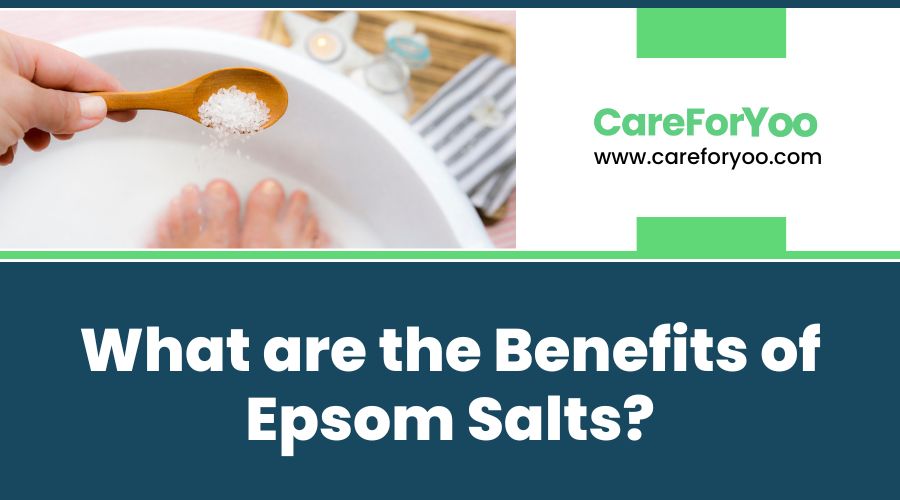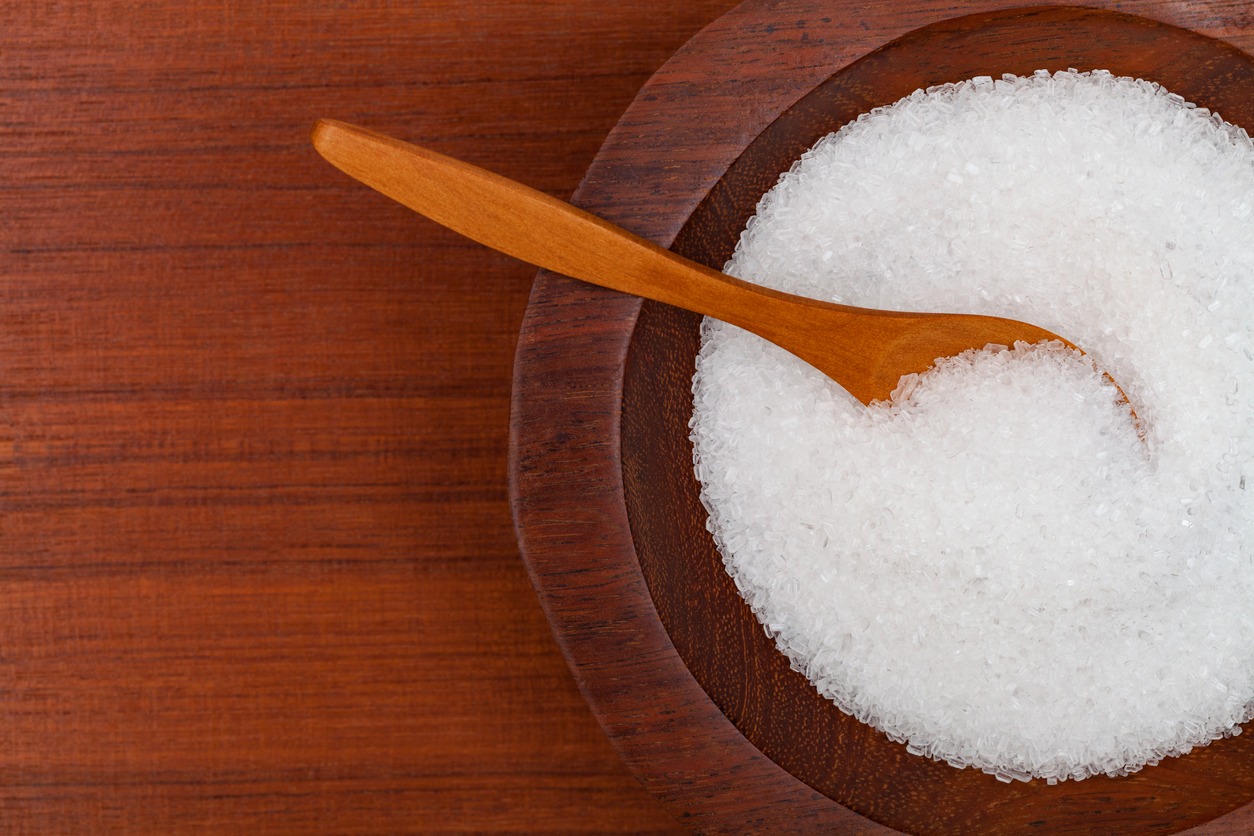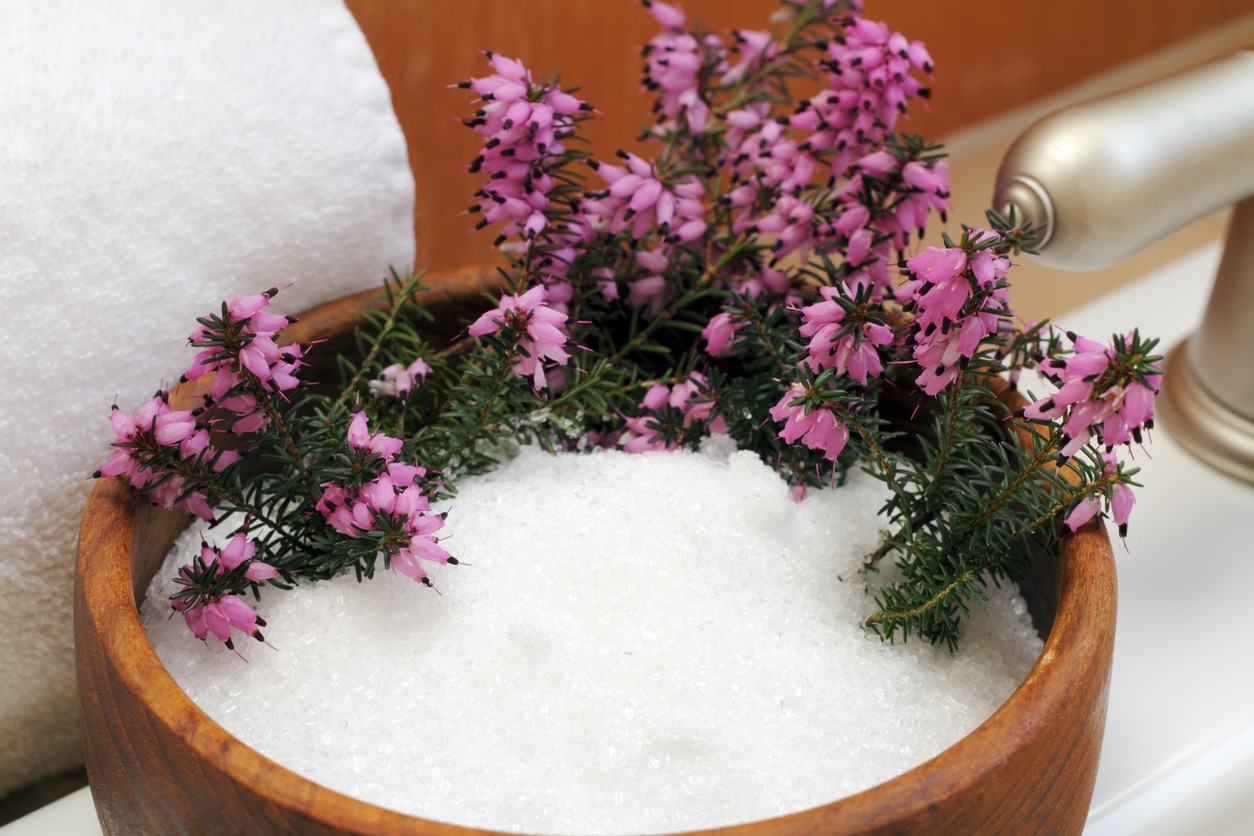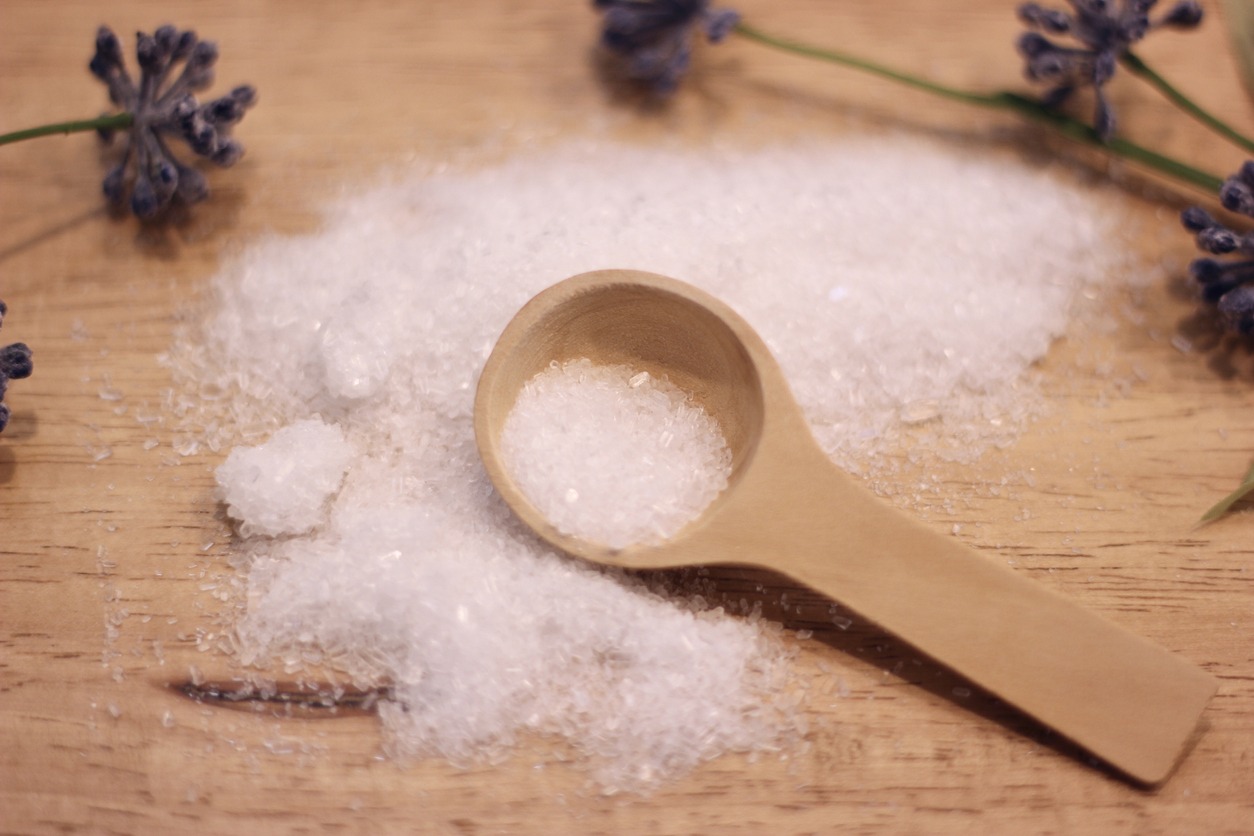There is a branch of healthcare that focuses on treating the mind and body and explores how they are closely related, and it is referred to as integrative medicine. It involves various treatments and practices, such as acupuncture, reiki, and hypnotherapy. In addition to those, another tool that integrative medical specialists usually recommend is Epsom salt due to its physical and mental health benefits.
Even though there are no clinical trials that have confirmed the benefits of Epsom salt, a lot of healthcare providers promote it for its reasonable price, ease of use, and minimally invasive delivery.[1] For hundreds of years, the uses and benefits of Epsom salt have been well known. Unlike other salts, it claims to soothe the body, mind, and soul.
If you have been given health advice by someone you know to use Epsom salt and are wondering what you can get from it, we are here to help you. In this post, we are giving you the benefits of Epsom salts.
What is Epsom Salt?
Epsom salt is also referred to as magnesium sulfate. It is a chemical compound made up of oxygen, magnesium, and sulfur. The name Epsom is derived from the town of Epsom in Surrey, England, where it was discovered. However, even though it is called salt, Epsom salt is very different from table salt. It was possibly termed “salt” due to its chemical structure.[2]
It also looks similar to table salt and is usually dissolved in baths, which is why others call it bath salt. However, it is not salty in taste like table salt. Epsom salt has a bitter and unpalatable taste. Other people still consume it by dissolving the salt in water and drinking it. However, due to its taste, it is not great to be added to food.
Epsom salt has been used to treat ailments for hundreds of years, including insomnia, fibromyalgia, and constipation. However, its effects on these conditions are not well-researched. The majority of the reported benefits of Epsom salt are attributed to magnesium, which is a mineral that many people do not get enough of. Epsom salt is available in most drug stores and grocery stores, and it can also be purchased online.[2]
How Does Epsom Salt Work?
When you dissolve Epsom salt in water, it releases sulfate and magnesium ions. These particles can be absorbed through the skin, providing people with magnesium and sulfates, which serve important bodily functions. However, despite claims, on the contrary, there is still no good evidence that sulfates and magnesium are absorbed into the body through the skin. The most common use for Epsom salt is in baths, where it is dissolved in bathwater. It can also be applied to the skin as a cosmetic or taken by mouth as a magnesium supplement or a laxative.[2]
The Common Uses of Epsom Salts
Epsom salt can be used in many different ways and for various reasons. It is popularly used for baths, but it can also be used for soaking your feet to relieve arthritis pain or to rub away any calluses. Below are the common uses of Epsom salt:[3]
For Health
Epsom salt is used by a lot of people to relieve the symptoms of different health conditions. Below are some of them:[3]
- Athlete’s Foot: You can soak your feet in an Epsom salt bath to help relieve the symptoms of athlete’s foot.
- Remove Splinters: To draw out the splinter, you can soak the affected skin area in an Epsom salt bath.
- Treat Toenail Fungus: The affected toes can be soaked in hot water mixed with a handful of Epsom salt thrice a day.
- Soothe Sprains and Bruises: Add two cups of Epsom salt to a warm bath and soak to reduce muscle soreness, pain, and swelling caused by bruises and sprains.
- Ease Gout Discomfort: If you are experiencing pain due to gout, you can reduce inflammation by adding 2-3 teaspoons of Epsom salts into a basin and immersing the affected joint or foot. The water can be as hot as it is comfortable, and you can soak your feet for around 30 minutes.
- For more tips when it comes to treating gout, you can read The Complete Guide – Treatment for Gout in the Feet.
For Beauty
Epsom salt can also be used for various beauty and skincare routines. Below are some good examples:[3]
- Exfoliate Dead Skin: You can use Epsom salt to exfoliate dead skin. You just have to mix a handful of it with a tablespoon of bath or olive oil and rub it all over your wet skin. Rinse thoroughly after application.
- Exfoliate Face Cleanser: To clean your face and exfoliate it at the same time, you can mix a half teaspoon of Epsom salt with your regular cleansing cream. Massage it gently on your skin and rinse with cold water.
- Dislodge Blackheads: You can add a teaspoon of Epsom salt and 3 drops of iodine into a half cup of boiling water. This mixture can be applied to your blackheads using a cotton ball to dislodge them.
- Remove Foot Odor: Mix a half cup of Epsom salt in warm water and soak your feet for 10 minutes. This can help remove bad odors, soothe achy feet, and soften rough skin.
- Remove Hairspray: You can also use Epsom salt to remove hairspray on your hair. Just mix a gallon of water with a cup of Epsom salt and a cup of lemon juice. Cover the mixture and let it set for 24 hours. The next day, you can pour it into your dry hair and leave it on for about 20 minutes before shampooing your hair normally.
- Hair Volumizer: To volumize your hair using Epsom salt, you can combine equal parts of deep conditioner and Epsom salt and warm it in a pan. Apply the warm mixture through your hair and leave it on for 20 minutes. After that, rinse your hair thoroughly.
For Household and Gardening
Aside from using Epsom salt for health and beauty, it can also be used for household and gardening purposes. Below are some of the best examples:[3]
- Clean Bathroom Tiles: If you mix equal parts of Epsom salt and liquid dish detergent, you can use it as a scrub on your bathroom tiles.
- Prevent Slugs: To prevent slugs, you can sprinkle some Epsom salt on or near interior entry points.
- As a Hand Wash: You can create an effective hand wash by mixing Epsom salt with baby oil. You can keep it by the sink.
- Clean Detergent Build-Up on Washing Machines: You can also use Epsom salt to clean your washing machine. Fill the machine tub with hot water and add some Epsom salt. After that, run an agitate/soak/agitate cycle to dissolve detergent build-up.
- Fertilize Houseplants: A lot of plants require sulfur and magnesium in order to stay in good health. Epsom salt can make the primary nutrients in most plant foods more effective. You can sprinkle some Epsom salt on your houseplants, flowers, and vegetables once every week to nourish them.
- Keep Your Lawn Green: When magnesium sulfate crystals are added to soil, they provide important nutrients that help prevent yellowing leaves and the loss of green color in plants. To do this, add two tablespoons of Epsom salt to one gallon of water. Sprinkle the mixture on your lawn to keep the grass green and healthy-looking.
- Insecticide Spray: You can also use Epsom salt to create an insecticide spray. Simply mix it with water and spray it on your lawn or garden to get rid of plant pests naturally.
The Benefits of Epsom Salts
Even though there is a lack of available scientific data, many people, including some healthcare professionals, claim that Epsom salt is therapeutic and use it as an alternative treatment for several conditions. Below are the different benefits that you can get from using Epsom salts:
Promotes Sleep and Stress Relief
Some experts suggest that stress relief comes from the warm bath itself. However, others believe that Epsom salt also helps stabilize mood and relieve stress, depression, and anxiety. In fact, others believe that taking magnesium increases serotonin, which is also called the happiness hormone, produced in the brain.[1] Aside from that, enough magnesium levels are important for sleep and stress management as it helps the brain produce neurotransmitters that induce sleep and reduce stress. It also helps the body produce melatonin, which is a hormone that promotes sleep.[2]
Helps with Constipation
Magnesium is usually used in treating constipation. It draws water into the colon, which promotes bowel movements. Most of the time, magnesium is taken by mouth for constipation relief in the form of magnesium hydroxide or magnesium citrate. But taking Epsom salt is also believed to be effective when it comes to constipation. Even though it is not well studied, the FDA lists it as an approved laxative.[2]
Post-Workout Recovery
There are people who claim that taking Epsom salt baths can help reduce muscle soreness and relieve cramps, which are both important when it comes to exercise performance and recovery. It is also known that enough magnesium levels are beneficial for exercise as magnesium aids the body in using glucose and lactic acid.
When you relax in a hot bath with Epsom salt, it may help you soothe aching muscles. But there is no evidence that people can absorb bathwater magnesium through their skin. Athletes are also prone to low magnesium levels. Therefore, health professionals usually recommend that they take magnesium supplements to ensure optimal levels.[2]
Reduced Pain and Swelling
Another popular claim is that Epsom salt can help reduce pain and swelling, particularly for those who are experiencing symptoms of arthritis and fibromyalgia. But then again, magnesium is deemed responsible for these effects since a lot of people with these health conditions are deficient in this mineral.[2]
The majority of the claimed benefits of Epsom salts are subjective. On the other hand, oral magnesium supplements may help in improving sleep, digestion, exercise, and pain in people who are deficient.[2]
Safety and Side Effects of Epsom Salts
While Epsom salt is generally safe, there are some negative effects that you can get from it if it is used incorrectly. According to doctors, Epsom salt baths are not recommended for people who have skin infections, open wounds, severe skin inflammation, and severe burns.
In addition to that, drinking Epsom salt for detox can cause serious side effects, such as severe diarrhea. There aren’t any studies proving that taking Epsom salt by mouth is safe or beneficial. In fact, it may lead to sudden or dramatic changes in bowel behavior, which, in turn, can be very dangerous and cause dehydration. Therefore, if you are curious about Epsom salt or have any concerns about it, it is always better to check with your healthcare provider before using it.[1]
Conclusion
Epsom salt may be beneficial when it comes to treating magnesium deficiency or constipation when taken as a supplement. However, consulting medical professionals is important if you intend to use it orally. On the other hand, many claims that Epsom salt is effective as a beauty product or bath salt.
Also, keep in mind that there isn’t a lot of evidence to support all of the reported benefits of Epsom salt. Most of its positive effects are mostly anecdotal, and more research is required on its functions. But it is generally safe and easy to use as a bath salt. It can be relaxing and soothing. Epson salt baths can also be meditative and are a great way to take a break from everyday stressors. We hope this post helped you learn more about the benefits of Epsom salts.
Aside from using Epsom salt, a foot massage is also a good way to take care of your feet. If you are looking for more tips and recommendations, you may read our Guide to Selecting the Right Foot Massage Solutions for You.
References
[1] Wellness Team. (2022, April 28). Epsom salt: Potential benefits and how to use it. Cleveland Clinic. Retrieved December 28, 2022, from https://health.clevelandclinic.org/7-things-you-probably-didnt-know-about-epsom-salt/
[2] Elliott, B. (2018, December 13). Epsom salt: Benefits, uses, and side effects. Healthline. Retrieved December 28, 2022, from https://www.healthline.com/nutrition/epsom-salt-benefits-uses#what-it-is
[3] SaltWorks, E. (2022). Epsom Salt Uses & Benefits. Seasalt.com. Retrieved December 28, 2022, from https://seasalt.com/salt-101/about-bath-salt/epsom-salt-uses-and-benefits




